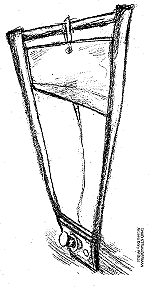![]()
![[ OPINIONS ]](/images/fall97/opinionsf97.gif)
![]()
By M. Stephanie Murray
Arizona Daily Wildcat February 6, 1998
God, sex and death in Texas
![[Picture]](04_3_i.gif)
M. Stephanie Murray |
This week's execution of Karla Faye Tucker made her the second woman to
be executed in Texas since the 1863 hanging of Chipita Rodriguez. Tucker
was 38 years old and a devout Christian when she was executed; at the time
of the double murder she sentenced for, she was a 24-year-old "drug-crazed
teen-age prostitute," according to wire reports.
Her execution became a moral tug-of-war between the two purported purposes of the American justice system: reform or punishment.
The puritan contingent advocates punishment, the "pay your debt to society" line. Time spent in prison is not intended to produce better people; criminals are simply "doing time." For them, capital punishment is a logical, albeit extreme, conclusion to a deserving crime.
The other side takes a more liberal stance on the purpose of prison. They also believe that there is a debt to be paid, but the payments buy more than social forgiveness, they buy a better person. For this group, jailhouse conversions and law degrees earned in lockdown are the most desirable outcomes of incarceration. Capital punishment, obviously, does not figure into this equation.
Most of the time we can meld these two points of view into one cohesive, communal opinion on the treatment of criminals. Even the extremes can be assimilated. For instance, if Maricopa County Sheriff Joe Arpaio forbids coffee and cigarettes to his inmates, reformers can see this as merely removing small vices, helping the prisoners overcome their larger vices. Punishers, on the other hand, can admire Arpaio for the mean bastard that he is.
The death penalty, however, cannot be so easily embraced by both sides.
For those into that kind of thing, death is the ultimate punishment. You really can't ask for anything harsher, at least not until the Supreme Court reverses its "cruel and unusual" ruling on drawing and quartering.
On the other hand, it's awfully hard to reform a dead con. Lethal injection tends to abruptly end any progress toward spiritual or intellectual betterment.
This dilemma of national consciousness came to a head with Tucker's case this week. The American public has gotten used to turning a bland eye to the executions of men. Texas alone has executed 144 men since the death penalty was reinstated in 1976. (Proof that the threat of death does not deter murder; if it did, you'd just get the hell out of Texas if you really, really wanted to kill someone.) But the last time a woman was executed was way back in 1982, in North Carolina. Tucker's gender, more than her religious salvation, was the thorn in America's side.
Much was made of Tucker's nightmarish childhood. Drugs and sex figured prominently in her life from very early on. She found religion just four months after her arrest for the pickax murder of two people. Some would read this as an example of how ready for salvation Tucker was. Having never before been offered the opportunity to be good, she leapt at the chance as soon as it appeared. True reformers would have concluded that prison was at that point unnecessary; Tucker was reformed before her trial had even ended.
So complete was Tucker's reform, in fact, that she was able to sway hard-line, pro-death-penalty conservatives like Pat Robertson. (Tucker appeared on Robertson's "700 Club" television show repeatedly before her execution.) Beverly Lowry, writing in The New Yorker, described her as "as radiant as a heater, turned up high." The Pope interceded on her behalf.

This obsession with religion, though, covered what really fascinated us about Karla Tucker. Every article pointedly observed that her gender played no part in her appeal to the public or her appeals to the Texas Board of Pardons and Parole. Eventually, these denials add up to an overwhelming amount of attention paid to Tucker's gender. There is such a thing as protesting too much. Lowry's article notes that the chairman of the Board of Pardons and Paroles visited Tucker while considering her appeal. "He has never visited another death-row inmate while an appeal was pending," notes Lowry, "and has said time and again that gender will not be a factor in the board's decision."
In the end, gender did not play a role in Tucker's death. She died Tuesday evening in a Texas prison. She believed that even if she was executed, the publicity surrounding her would help spread the word of her God. "I think we're going to reach a lot of people," she told Lowry two weeks before her death, pointedly using the plural pronoun.
But, again, her religion hides the true effect. Tucker's death has brought the death penalty back to the American public's attention. If we are so squeamish at the death of one woman, how can we so casually accept the death of even one male prisoner, let alone the 431 who have been executed since 1976?
M. Stephanie Murray is a senior majoring in English literature. Her column, "What Fresh Hell?," appears sporadically.



